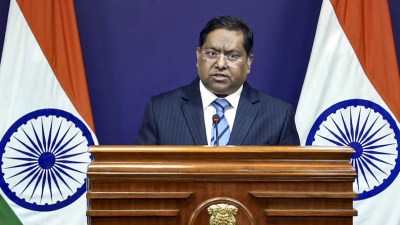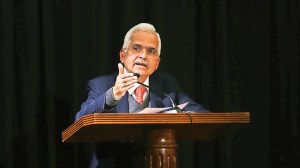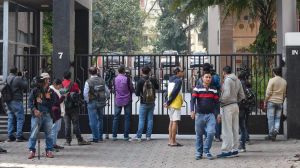Debating American Idle With Thomas Friedman
The third edition of Express Adda,held last week in Delhi,underlined why there are no flat conversations with Friedman
Hes famous for his book,The World is Flat,which he wrote in 2005 after spending time in Bangalores Silicon Valley. The globe-trotting New York Times columnist has just released his seventh book and it has,predictably,led to heated debate. Friedman was,thus,the ideal person to feature as the third guest of honour at the Express Adda series,held at the LAP Garden in Samrat Hotel,New Delhi. His stature and reputation his columns are syndicated regularly in the Indian Express as an intellectually energising and compelling chronicler of the impact of globalisation on the world was enhanced considerably by his wit and candour. He is also,as Editor-in-Chief of the Indian Express Group,Shekhar Gupta,said in his welcoming remarks,a friend of India,adding that every time Freidman visits India,it is marked as a red letter day in his diary.
The high-powered audience seemed to agree,with a distinguished gathering having turned up to exhange views with the author in the informal setting of the Express Adda format. They included ambassadors,policy makers,cultural experts,businessmen,senior lawyers and representatives of the media who engaged,even argued,with Friedmans incisive analysis of the worlds maladies. Most of the questions related to his latest book,That Used To Be Us: How America Fell Behind In The World We Invented and How We Can Come Back,which a surprising number had already read. More than one member of the audience questioned his conclusions about a decline in America,and instead argued that the rest of the world had played catch up in multiple areas.
The debate was enlivened by Friedmans turn of phrase and his grasp of global affairs,with the conversation ranging from the impact of the Arab Spring to the crisis in the Eurozone,educational standards and unemployment in America and the consequences of climate change. Three times winner of the Pulitzer Prize,Friedman has earned a reputation for unconventional thought and word and it was in full display during his witty exchanges with the assembled guests. As the title of his new book suggests,he is not very optimistic: The United States is like a car moving without a bumper and spare tyre; it cant afford another hit now, he quipped,when a guest asked what would happen if another crisis like Lehman Brothers was to occur.
The engrossing evening was part of a series of conversations with people who lead and motivate change in the contemporary world. The two previous guests of honour were Sir Martin Sorrell,Chief Executive Officer of the WPP group,who talked about India as a super brand,and Bollywood Badshah Shah Rukh Khan,who dwelt on the influence that the Hindi film industry wields over other cultures. Friedman took it to another level when he spoke about Indias place in the post-globalised world,adding why America should have focused on the winners China and Brazil too,instead of engaging with the diminishing and losing pursuit of terrorism.
Friedmans summing up was the most enervating part of the evening as he analyed the decline in the five pillars of the American success story education,infrastructure,immigration,incentivised capital formation and government-funded research.
At the end of the informal discussion,Friedman was,predicatably enough,reminded of the analysis and views he had expounded in The World is Flat in the context of todays global hyper-connectivity. True to form,he gently reminded the audience that he wrote The World Is Flat at a time when the cloud was still in the sky,Linkeden was a prison in America,Twitter was the sound of a bird and Skype was considered a typo.
- 01
- 02
- 03
- 04
- 05































